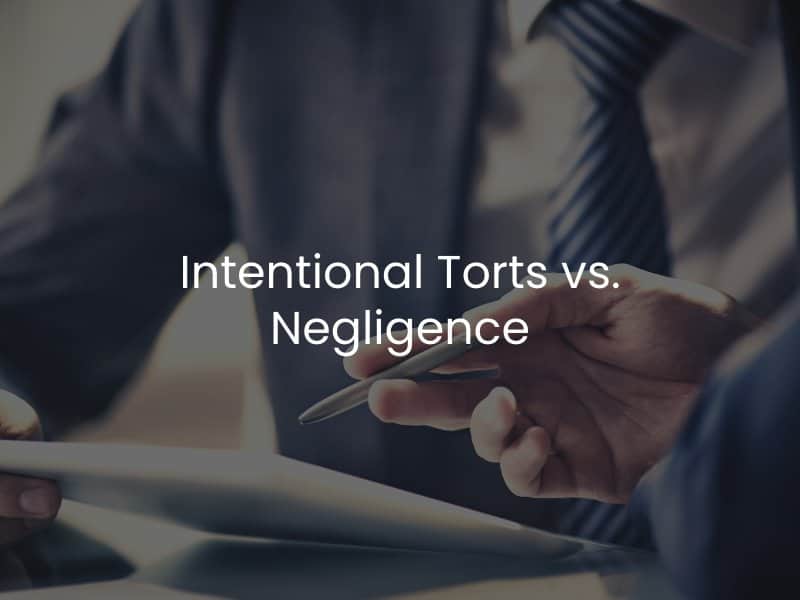Intentional Torts vs. Negligence
Injuries can occur in a wide variety of ways. In some cases, individuals are actually harmed due to the intentional actions of others. When these incidents occur, the perpetrator of the injury must be held accountable, both criminally and civilly. However, there are times when injuries occur as a result of the negligence of others, though the perpetrator of the injury may not have necessarily meant to cause harm to another.

What is Negligence in a Tort Claim?
The vast majority of personal injury claims will revolve around one person causing harm to another person as a result of their negligence or carelessness. Just about any type of accident-based injury claim will fall under the umbrella of a negligence-based tort. It includes vehicle accidents, slip and fall incidents, dog bite incidents, etc.
There are four basic elements of negligence-based torts that must be proven in order for a claim to be successful:
- Duty. In general, every person has a legal obligation to exercise some type and level of care to others. For example, drivers have a duty to operate their vehicles safely on the roadway. Grocery store owners have a duty to ensure that their premises are safe and that all floors are clear from slip and fall hazards. A duty exists everywhere, it just differs depending on the situation.
- Breach of duty. In order for a personal injury lawsuit or claim to be successful, it has to be shown that one individual breached their duty of care to another individual. For example, if a driver operates their vehicle while intoxicated, they will have breached their duty of care to others on the roadway.
- Causation. It has to be shown that a breach of duty directly caused injuries to another person. It is not enough for a breach of duty to occur – the injured party has to show that the breach of duty directly caused their injuries.
- Damages. It has to be shown that an injury victim suffered some sort of loss as a result of the breach of duty and the injuries. This can include medical expenses, lost wages, pain and suffering damages, etc.
What is an Intentional Tort?
A “tort” is a legal term used to define a civil wrong that causes a person to suffer a loss or harm. This typically results in legal liability for the person who commits a tortious act.
An intentional tort is a legal wrong committed on purpose. In general, intentional tort cases arise when a defendant intentionally causes harm or offense to another individual (or at least threatens harm or offense to another individual).
There are various ways that intentional tort claims arise, some of the most common being:
- Battery. This indicates any type of harmful or offensive contact with another individual, even if no injury actually occurs.
- Assault. The definition of assault varies by jurisdiction but typically includes any type of intentional act that places a person in reasonable fear of imminent harm.
- False imprisonment. This occurs any time an individual intentionally restrains the movement of another person without a legal right to do so.
- Trespassing. The unlawful entry onto another person’s property can form the basis of an intentional tort claim.
Recovering Compensation for a Tort Claim
Regardless of whether or not an individual has been harmed as a result of an intentional action of another or due to the negligence of another, injury victims need to work with an experienced injury attorney. A skilled lawyer can fully investigate every aspect of an intentional tort or negligence case in order to successfully recover compensation for their client.